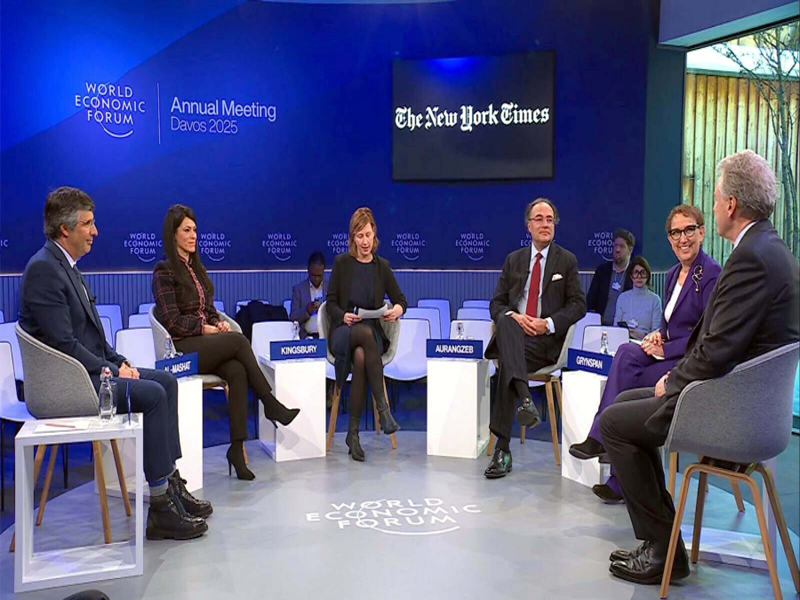Aurangzeb asserts Pakistan is 'on the right path' at WEF

- 113
- 0
DAWAS: Pakistan's Finance Minister Muhammad Aurangzeb expressed optimism about the country's economic trajectory during a panel discussion at the World Economic Forum (WEF) in Davos, emphasizing the government's efforts to address fiscal challenges.
Discussing debt sustainability, the session titled "Back into the Black: How to Ease the Debt Structure?" highlighted Pakistan's focus on economic reforms and improving its fiscal health. Aurangzeb pointed out that Pakistan has made significant progress, particularly in improving its tax-to-GDP ratio, which had remained between 9-10% for years. "We are now, through structural reforms, moving towards 13.5%," he revealed, adding that the government was working towards achieving a more sustainable tax framework. He also underscored the importance of controlling public spending and reducing the burden of debt servicing. Addressing Pakistan's debt situation, Aurangzeb noted that the country's debt-to-GDP ratio has decreased from 78% to 67%. While acknowledging that there is still work to be done, he reassured the international community that Pakistan is "moving in the right direction" on fiscal consolidation. The finance minister also addressed the issue of borrowing, stating that the problem lies not in borrowing itself, but in how the borrowed funds are used. He argued that loans should be directed towards enhancing productivity, fostering exports, and investing in projects that lead to long-term economic growth, rather than financing subsidies or routine expenses.
On Pakistan's growth trajectory, Aurangzeb pointed out that the country's economic expansion has been inconsistent. "When GDP growth reaches 4%, because the economy is import-led, we run out of foreign exchange, which leads to a balance of payment crisis," he explained. This, he noted, often results in Pakistan seeking assistance from the International Monetary Fund (IMF). He stressed the need for a shift towards export-led growth, which he believes is essential for achieving sustainable economic development. Aurangzeb also touched on the China-Pakistan Economic Corridor (CPEC), stating that Phase II of the initiative would focus on fostering business-to-business (B2B) collaboration, moving away from the earlier government-to-government (G2G) model. He highlighted the government's efforts to attract Chinese companies to relocate manufacturing units to Pakistan, with the aim of boosting exports. On the matter of capital market diversification, the finance minister stated that Pakistan is learning from Egypt's experiences to enhance its access to global capital markets. He disclosed that the government is working towards issuing a Panda bond, which would allow Pakistan to tap into China's extensive capital market.
Addressing concerns about the ongoing brain drain, Aurangzeb acknowledged the challenges but emphasized that Pakistanis should pursue opportunities abroad if they align with their career aspirations. However, he reiterated that the government is focused on creating the necessary ecosystem to encourage domestic employment, particularly in sectors like information technology (IT), where he believes there are substantial opportunities for youth. "The government is not in the business of doing business," he stated, but highlighted the vast potential within Pakistan's IT sector, which he views as a key area for the country's future growth.

















































